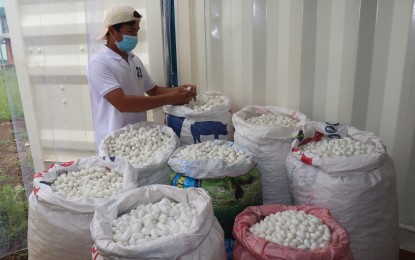
LOCALLY PRODUCED TEXTILE. Photo shows silk cocoon production for natural textile. The Philippine Textile Research Institute (PTRI) wants a wider audience for local fabrics. (Photo courtesy of PTRI)
MANILA – As the country observes the Philippine Tropical Fabrics (PTF) Month, the head of the Philippine Textile Research Institute (PTRI) on Thursday expressed wishes that local fabrics will attract a wider audience.
In a televised briefing, PTRI Director Julius Leaño said the PTF Month technically mandates the government locally made and locally sourced materials such as natural fibers, in their uniforms.
"We hope that all government agencies (personnel) will be able to wear something locally made," he said, adding that the House of Representatives started using tropical fabric in their uniform last year.
He also cited that the PTRI has tapped some designers such as Francis Libiran and Avel Bacudio when they introduced bamboo textile to the public last year.
"They (designers) have been using it (bamboo yarn) even before. However, previously, bamboo textiles are only appealing to older people... We want to make it mainstream, especially for the younger generation," Leaño said.
Bamboo, he said, is a good source of raw material since it grows in many areas and has 50 percent fiber recovery.
Local materials can also be developed through the use of innovation. Leaño cited pineapple leaves and banana trunks as other sources of fiber.
Water hyacinth, which clogs the waterways, can also be a source of fiber.
"These are locally grown, sometimes even valorized. When we say valorized, it means useless materials could be brought back to the supply chain," he said.
Leaño also said that banana fruit, for instance, could be sold for about PHP35 per kilo, but a kilo of fiber sells for about PHP400. Thus, farmers could also earn extra.
The role of science, he said, is to help make the fibers and textiles more affordable and more accessible.
Aside from wearables, the PTRI is also exploring on the use of local materials for home textiles that are thicker and water-repellent. (PNA)
